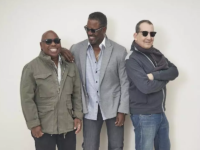To look at the title line and to see these names anywhere near the word “bop” is bound to cause confusion to some. After all, what do smooth jazz musicians have anything to do with ‘real’ jazz like bebop, for instance? A lot more than you might think.
You can go read the bios of just about any smooth jazz luminary and you’ll find a lot of woodshedding over jazz standards in their history, learning how to improvise like Coltrane and negotiate Monk’s tricky changes. Some of these guys attended Berklee or some other highly regarded conservatory and have worked under jazz greats (ex: Loeb with Stan Getz, Lorber with John Scofield). But they all made their mark in another idiom (or another corner of the same idiom, depending on how you look at it), and built up their fanbases doing that sort of thing. That doesn’t mean they forgot where they came from.
Bop (ArtistShare, April 14, 2015) is a reminder — or for some, a revelation — that these cats can seriously play. Not that there should be any doubt that the likes of Harvey Mason, Randy Brecker, John Patitucci, and of course, Lorber and Loeb have the chops, but this one-time get together of name smooth/semi-smooth jazzers is a treat nonetheless. They play nothing but classics of bop with genuine exuberance and a deep understanding of the songs and those tricky chord changes contained within.
Of course, ‘straight ahead’ means ‘all acoustic’…well, almost. Lorber doesn’t give up his Rhodes for these sessions but as he amply demonstrates, an electric piano can work quite well in this idiom when it’s in the right hands. There had always been a lot of jazz in his approach, so there’s really no transition required; his signature improv style adapts without adjustment to the mainstream jazz environment. Joining him for all but one of the nine jazz standards are Loeb (guitar), Everette Harp (tenor sax), Mason (drums), Brian Bromberg (acoustic bass), Rick Braun (trumpet, trombone) and another trumpeter, Till Brönner.
Every tune on this menu can be found on any jazz fake book, but there’s no faking it through these sessions. Given the small window of time available to get these names in the studio at the same time, there was no time to apply gloss to these tracks, and they’re all the better for it.
The Thelonious Monk songs “Straight No Chaser” and “‘Round Midnight” dispel any doubt about Rick Braun’s chops, especially on the latter, which even with its Miles Davis arrangement, the smooth jazz trumpet star avoids aping the Prince of Darkness and comes up with licks all his own.
And speaking of licks, Loeb has an endless supply of ’em. He lays down tasty solos on Dizzy Gillespie’s “A Night IN Tunisia” and Charlie Parker’s “Now’s The Time,” while delivering creamy Wes Montgomery octaves on “All The Things You Are,” the one tune where the horns lay out. Harp shows off his RnB upbringing more than anyone else, and it shows up in a good way with the in-the-pocket solo he provides for Sonny Rollins’ calypso classic “St. Thomas,” where we also get treated by Braun’s brash trombone.
Eric Marienthal lends his alto sax to the Lorber/Loeb/Harp/Braun/Brönner/Mason/Bromberg band for, appropriately, Parker’s “Now’s The Time,” a song that Lorber coyly reharmonizes from behind in his comping role. The lineup is nearly completely overhauled for John Coltrane’s “Giant Steps”: joining Lorber and Loeb this time is Patittucci (bass), Brecker and Brian Dunne (drums). Brecker, who’s had more straight jazz dates than perhaps everyone else in the room put together, puts in the kind of assured, fluid trumpet solo than only a five-decade veteran can do.
The music here is fine but here’s the best part about Bop: these major artists were assembled to record these performances in order to make an album for the purpose of raising funds for and awareness of a potentially life-threatening disease, Polycystic Kidney Disease (PKD). It’s a genetic condition with no cure, often requiring a kidney transplant. Lorber was afflicted with PKD, but fortunately, he was the successful recipient of a transplant from his wife. As a spokesman and advocate for the PKD Foundation, Lorber is working to help others with PKD attain outcomes similar to his and not like his mother and sister who had both sadly succumbed to the disease.
Sale proceeds of Bop go to the PKD Foundation and toward a cure for PKD. Any smooth jazz fans this album turns on to toward the ‘other’ side of jazz — the jazz that originally inspired their heroes — well, that would be the icing on the cake.
- Christian Marien Quartett – ‘How Long Is Now’ (2024) - April 18, 2024
- Dave Douglas, feat. James Brandon Lewis – ‘Gifts’ (2024) - April 11, 2024
- Thollem – ‘Worlds In A Life, Two’ (2024) - April 8, 2024




